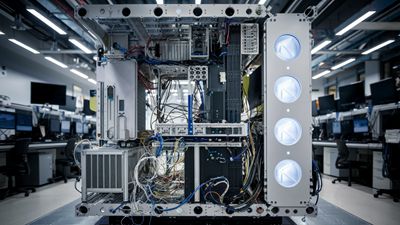ResMed (RMD): A Buy For Investors Seeking Long-Term Upside
ResMed, a company with a strong foothold in the sleep apnea market, has recently been the subject of financial analysis and speculation regarding its investment potential. Amidst a competitive landscape and recent operational changes, the company presents a compelling case for long-term investment. This report evaluates ResMed’s financial health, market position, recent operational changes, and growth prospects to determine its viability as a long-term investment.
Financial Health and Performance
ResMed’s financial stability is underlined by its solid operating cash flow and ability to return value to shareholders through dividends. With an operating cash flow of $286.3 million in the third quarter, and dividend payouts amounting to $72 million, ResMed demonstrates robust financial management. Furthermore, the company has reported a considerable amount of de-identified medical data in the cloud, highlighting its advancement in the digital health space.
Despite a downturn that saw the share price drop by 18% over the past 12 months, analysts have set an outperform rating with a $33.40 price target, suggesting a potential upside of approximately 27% for investors over the next 12 months.
Market Position and Competitive Landscape
ResMed operates in a highly competitive environment, with major players like Phillips Respironics dominating the sleep apnea market. Despite this, ResMed has managed to maintain a significant market share and is considered one of the top three companies in the industry. This competitive edge is crucial for long-term growth and sustainability.
Analysis of Long-Term Risks and Challenges
Supply Chain Vulnerabilities
ResMed has acknowledged the difficulties presented by the global supply chain disruptions, which have been a major pain point for the company in recent quarters. Although there is an expectation that these issues will ease in the June quarter, the long-term stability of the supply chain remains uncertain. The company’s efforts to re-engineer products and find new suppliers are commendable, but they also introduce new risks related to quality control and the integration of new components and materials.
Market Competition and Regulatory Risks
With Philips’ ongoing respiratory device recall issues, ResMed has seized opportunities in the CPAP machine market. However, this also places the company in a position where it must navigate the complexities of increased market scrutiny and potential regulatory challenges. The company must ensure that its products continue to meet the highest safety and efficacy standards to maintain consumer trust and avoid potential recalls or regulatory penalties.
Workforce Adjustments
In response to market conditions and strategic priorities, ResMed has made short-term workforce adjustments. While these adjustments may be necessary for operational efficiency, they can also lead to challenges related to employee morale, retention, and the loss of institutional knowledge. The long-term impact of these workforce changes on the company’s innovation capacity and operational effectiveness remains to be seen.
Financial Performance and Investor Sentiment
ResMed’s shares have experienced volatility, with a significant drop of 37% due to struggles with profitability and investor fears related to weight loss drugs. While the company has reported a 16% increase in revenue, earnings have been down. This discrepancy raises concerns about the company’s cost structure and its ability to sustain profit margins in a competitive and cost-sensitive market.
Cycling Past Highs of Ventilator Sales
The pandemic-induced surge in ventilator sales has set a high benchmark for ResMed’s revenue streams. As the world recovers from the pandemic, there is a likelihood of a decline in demand for ventilators, which could result in a challenging comparison for future sales performance.
Strategic Focus and Product Innovation
ResMed has been actively redesigning some of its products and turning to new suppliers to address supply chain challenges. While innovation is critical for staying competitive, there is an inherent risk associated with the introduction of new products to the market. The company must balance the need for innovation with the potential for cannibalization of its existing product lines and the risk of unanticipated product failures or market rejection.
Strong Revenue Growth
A critical indicator of ResMed’s growth trajectory is its revenue performance. With a 3-year average annual revenue growth rate of 12.2%, ResMed has outperformed 63.49% of companies in its industry. This consistent increase in revenue underscores the company’s ability to expand its market share and capitalize on the growing demand for its products and services. The revenue growth is a testament to ResMed’s strong business model and its successful strategies in product innovation and market penetration.
Solid Profitability and Margins
ResMed’s financial health is further evidenced by its strong profitability and solid margins. These financial metrics are crucial, as they reflect the company’s efficiency in converting sales into actual profit. High-profit margins are indicative of ResMed’s pricing power, cost control, and overall operational efficiency. The company’s ability to maintain profitability, even in challenging economic times, reinforces investor confidence and indicates a sustainable growth path.
Forward-looking Strategies
The company’s forward-looking strategies, especially its epidemiology model for sleep apnea, indicate a deep understanding of the market’s future. ResMed’s projections over the next two to three decades demonstrate the company’s commitment to long-term planning and its readiness to address the evolving needs of the sleep apnea market. The expected average annual EPS growth rate of 10.4% for 2024/2025/2026, although slightly down from 10.9% six months prior, still confirms a positive outlook for the company’s growth.
Adoption of New Operating Model
In November 2023, ResMed announced the adoption of a new operating model designed to accelerate long-term growth. This strategic move introduces dedicated leadership in Product, Revenue, and Marketing to the global executive team, aiming to enhance the company’s agility and focus on core growth areas. This reorganization is expected to streamline operations and align the company’s resources more closely with its growth objectives.
Conclusion
Considering the financial robustness, market position, strategic operational changes, and growth prospects, ResMed appears to be a sound investment for those seeking long-term rewards. The company’s ability to generate strong cash flows and maintain a competitive stance in a tough market bodes well for its future.
Although the stock has experienced a recent decline in value, the potential upside suggested by analysts, coupled with the company’s strategic initiatives to accelerate growth, presents a compelling case for investment. It is reasonable to conclude that ResMed’s shares are currently undervalued and offer an attractive entry point for long-term investors.
To become a better investor with our AI Assistant @ kavout.com/investgpt


